The Greening of Football
By John Nicholson


The Greening of Football
John Nicholson


How green is your football club? More profoundly, how green is football as a global industry? Environmentalism and football are rarely mentioned in the same breath, but the climate crisis is the greatest challenge we face on earth. And football has a huge role to play in tackling it.
Some clubs have made positive strides forward, installing charging points for electric cars, recycling rainwater, making everything sold in the stadium recyclable, banning single use plastics, sourcing electricity from renewables, using recycled paper for programmes and installing solar panels.
And these are all the sort of progressive measures that any business should be addressing. Not to do so where at all possible is fundamentally irresponsible.
According to the 2020 Premier League Sustainability Table produced by Sport Positive, Tottenham are the greenest top-flight club in England.
Spurs, who have signed up to the United Nations' Sports for Climate Action framework, scored maximum points in the second edition of the rankings, finishing narrowly ahead of Arsenal, Brighton and Manchester United, who each scored 20/21.


How green is your football club? More profoundly, how green is football as a global industry? Environmentalism and football are rarely mentioned in the same breath, but the climate crisis is the greatest challenge we face on earth. And football has a huge role to play in tackling it.
Some clubs have made positive strides forward, installing charging points for electric cars, recycling rainwater, making everything sold in the stadium recyclable, banning single use plastics, sourcing electricity from renewables, using recycled paper for programmes and installing solar panels.
And these are all the sort of progressive measures that any business should be addressing. Not to do so where at all possible is fundamentally irresponsible.
According to the 2020 Premier League Sustainability Table produced by Sport Positive, Tottenham are the greenest top-flight club in England.
Spurs, who have signed up to the United Nations' Sports for Climate Action framework, scored maximum points in the second edition of the rankings, finishing narrowly ahead of Arsenal, Brighton and Manchester United, who each scored 20/21.
Points were awarded in eight categories: Clean Energy, Energy Efficiency, Sustainable Transport, Single Use Plastic Reduction or Removal, Waste Management, Water Efficiency, Plant-based/Low carbon food and Comms & Engagement on Sustainability.
Points were awarded in eight categories: Clean Energy, Energy Efficiency, Sustainable Transport, Single Use Plastic Reduction or Removal, Waste Management, Water Efficiency, Plant-based/Low Carbon Food and Comms & Engagement on Sustainability.
The fact that some clubs are doing nothing or very little in any of these areas to combat climate change should not even be legal.
They should be on a warning: make changes by a set date or you cannot open for business.
Because this is serious now. We need a complete and total reassessment of football’s impact on the environment and on climate change and for it to be done at an international level.
This cannot be left up to the whims of each club’s owners to decide whether they would like to help fight climate change or not. It must be an obligation.
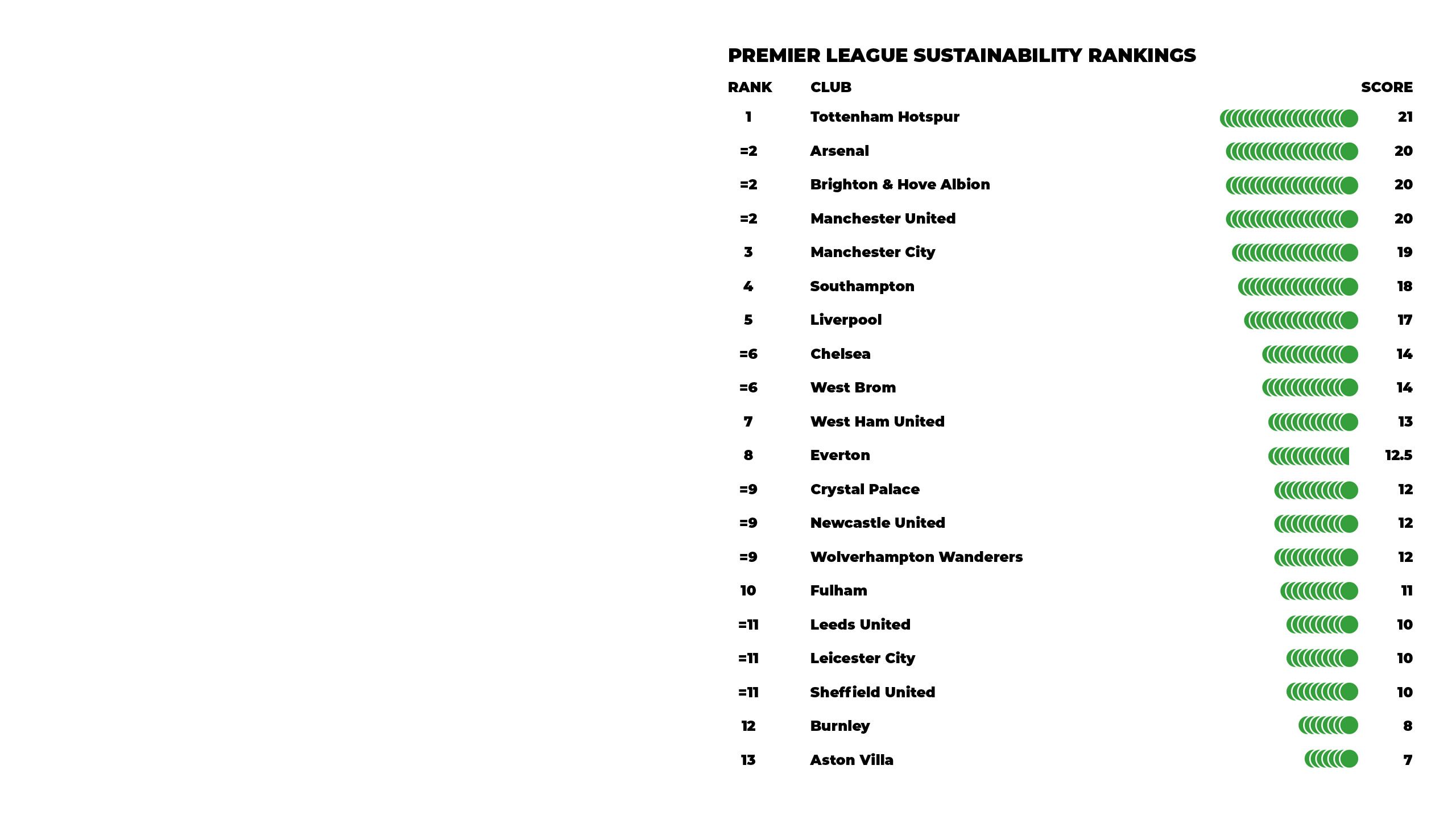
The fact that some clubs are doing nothing or very little in any of these areas to combat climate change should not even be legal.
They should be on a warning: make changes by a set date or you cannot open for business.
Because this is serious now. We need a complete and total reassessment of football’s impact on the environment and on climate change and for it to be done at an international level. This cannot be left up to the whims of each club’s owners to decide whether they would like to help fight climate change or not. It must be an obligation.
Forest Green leading the way
It can be done and we already have an example in Forest Green Rovers, famously the world’s first carbon neutral club. They have really addressed the issue in more granular detail. Their high-profile decision to not serve meat-based products to the players or fans is merely the tip of their green iceberg. They have set a green standard for small clubs that surely is achievable by every similar organisation with proper financial planning.
Importantly, Forest Green have an informed understanding of why it is a vital issue. Their environmental policy is thoughtful and comprehensive and could easily serve as a template for the whole of football to follow.
The entire club has sustainability at its core. It is powered by 100% green electricity and carbon neutral gas from Ecotricity, some of which they self-generate from the solar panels on the stadium roof and the solar tracker at the ground entrance.
They have an organic pitch, maintained without use of pesticides and herbicides. They collect rainwater from beneath the pitch to use for irrigation. Electric vehicle charging points are provided. They even use an electric GPS-directed, solar-powered ‘mowbot’ to cut the grass.
And these are just some of their achievements as they look to move into a sustainably built new stadium constructed entirely from wood.
These are not mere gimmicks, they are a way of living differently, rooted in an informed understanding of the environmental issues we face today.
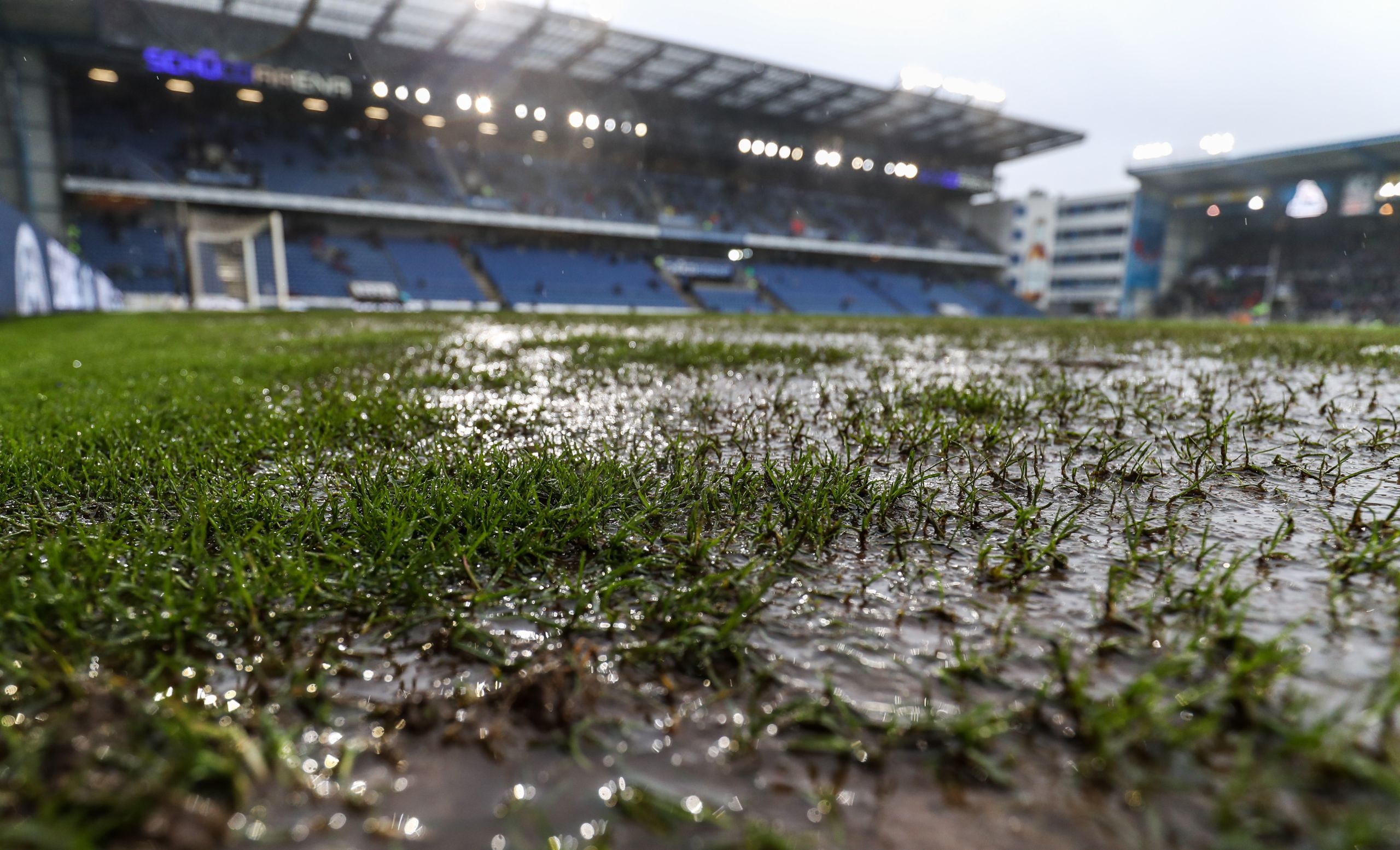
Forest Green leading the way
It can be done and we already have an example in Forest Green Rovers, famously the world’s first carbon neutral club. They have really addressed the issue in more granular detail. Their high-profile decision to not serve meat-based products to the players or fans is merely the tip of their green iceberg. They have set a green standard for small clubs that surely is achievable by every similar organisation with proper financial planning.
Importantly, Forest Green have an informed understanding of why it is a vital issue. Their environmental policy is thoughtful and comprehensive and could easily serve as a template for the whole of football to follow.
The entire club has sustainability at its core. It is powered by 100% green electricity and carbon neutral gas from Ecotricity, some of which they self-generate from the solar panels on the stadium roof and the solar tracker at the ground entrance.
They have an organic pitch, maintained without use of pesticides and herbicides. They collect rainwater from beneath the pitch to use for irrigation. Electric vehicle charging points are provided. They even use an electric GPS-directed, solar-powered ‘mowbot’ to cut the grass.
And these are just some of their achievements as they look to move into a sustainably built new stadium constructed entirely from wood.
These are not mere gimmicks, they are a way of living differently, rooted in an informed understanding of the environmental issues we face today.

That informed understanding is where the rubber hits the road on green issues. Without really grasping why this is the most important challenge of our lifetimes, we risk any attempt towards the greening of football being little more than box-ticking tokenism or PR lip service.
Climate change and environmentalism more widely isn’t just a big issue, it is the biggest issue. And it’s too big for many to really comprehend.
Even when there is a terrible storm which floods homes and drowns people, it is easily dismissed, especially by those who it does not affect, as ‘just one of those things.’ Bad weather has always happened, after all. So we ignore it, put our heads down or look for get-out clauses to excuse ourselves.
But climate change isn’t down to dumb luck. It is every bit as much cause and effect as covid-19 is. You put so much carbon into the atmosphere and climate change comes out.
A report produced by David Goldblatt for the Rapid Transition Alliance last year found that of the 92 league teams in England, 23 can expect partial or total annual flooding of their stadiums by 2050.
Under threat in the Premier League are Southampton’s St Mary’s, Norwich’s Carrow Road, Chelsea’s Stamford Bridge and West Ham’s Olympic Stadium, while seven are at risk in the Championship. This is not something we can just go on ignoring.
This is where football could make such a difference in informing, educating, inspiring, and setting an example for its public, yet in the Premier League Sustainability Table, exactly half the clubs scored zero for ‘Comms & Engagement on Sustainability', doing little or nothing at all in this regard.









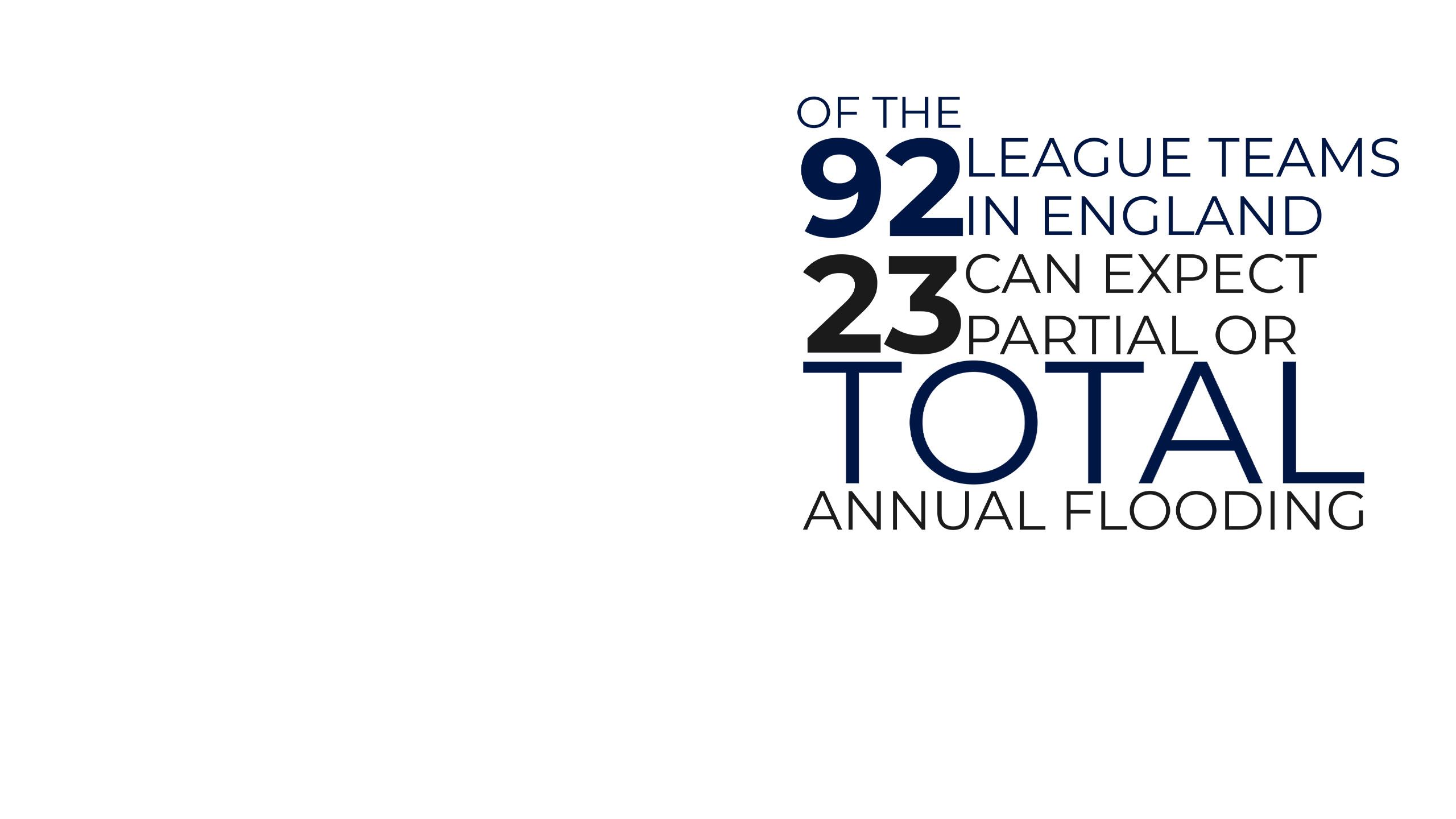
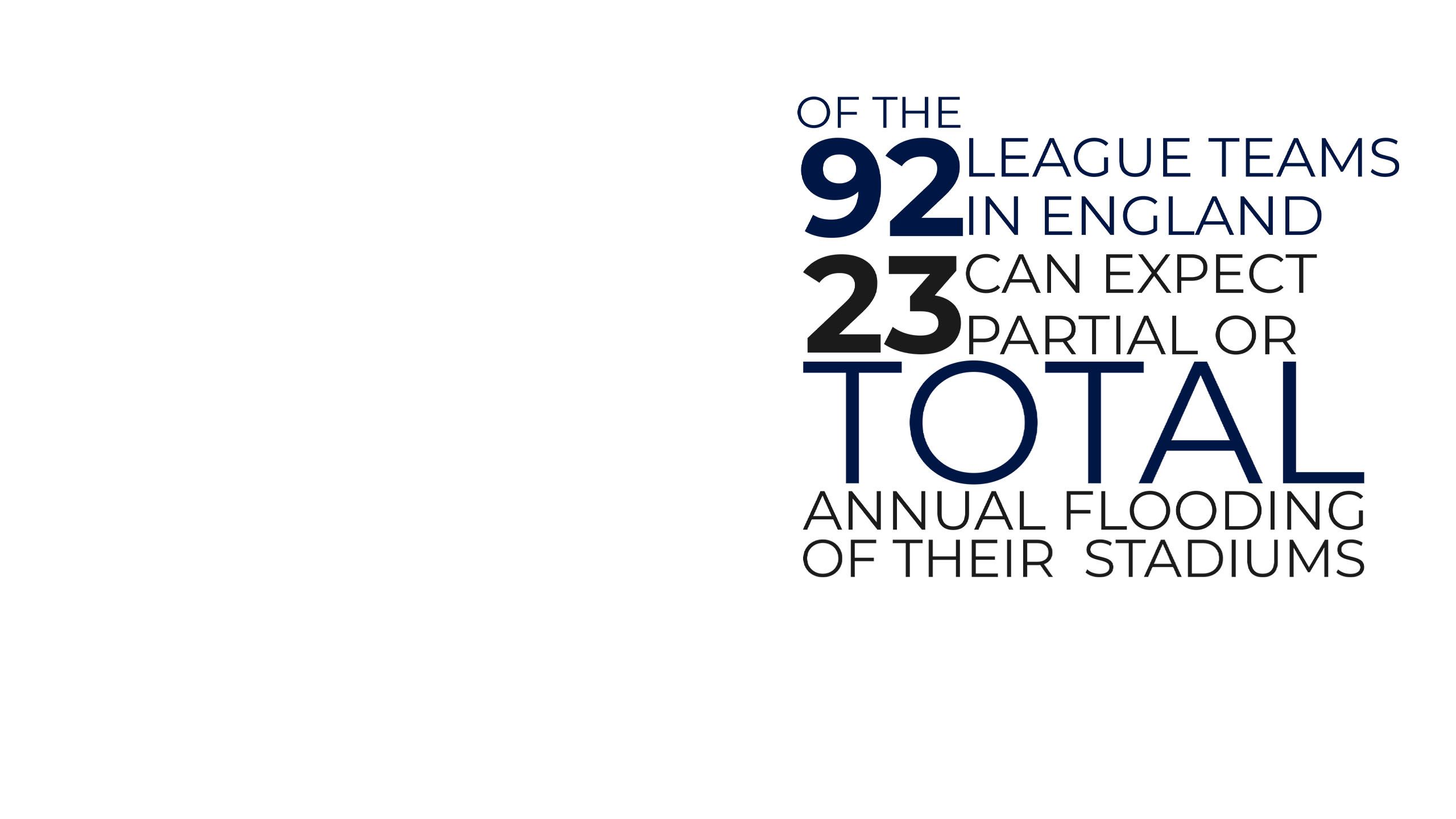
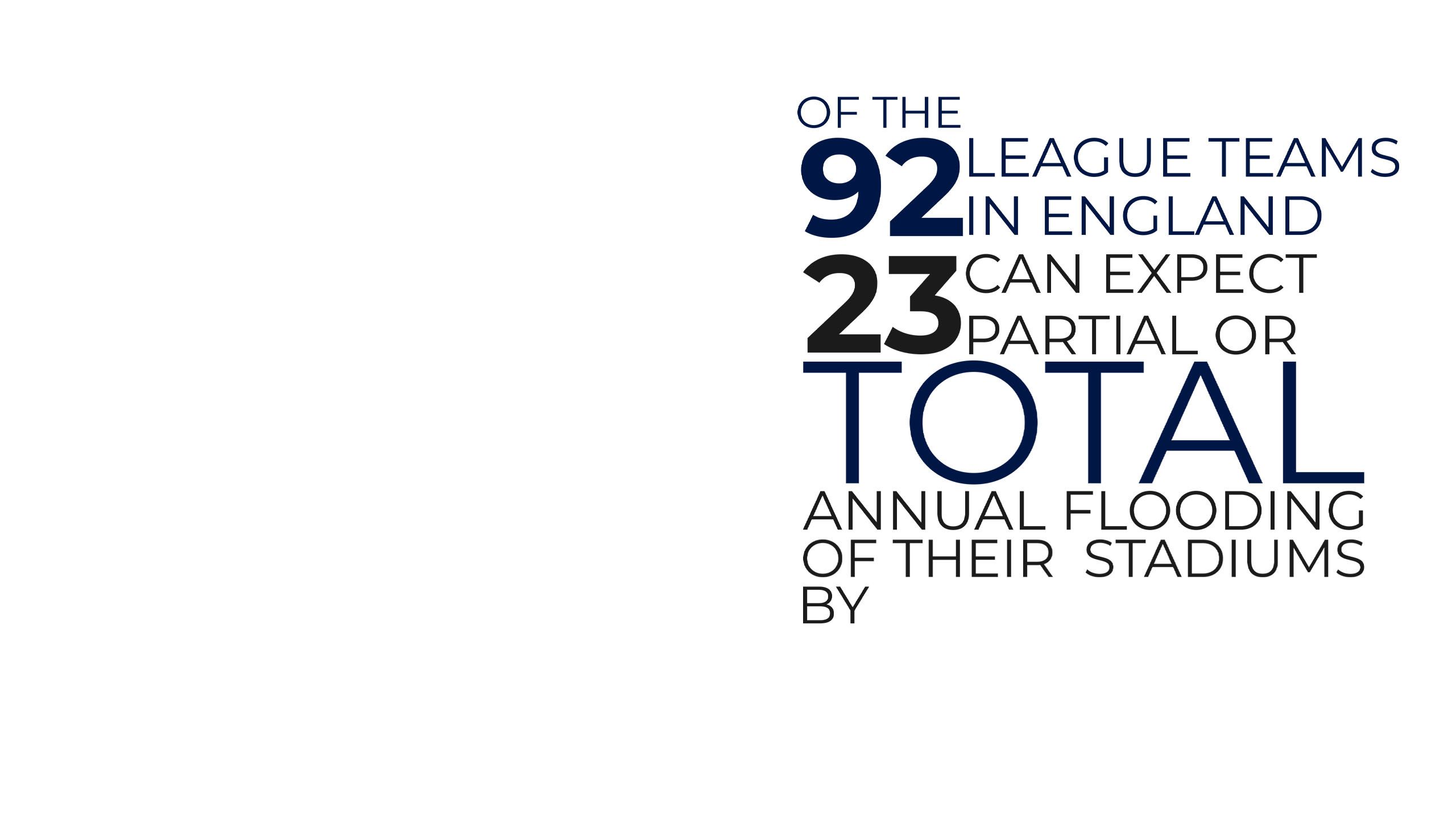
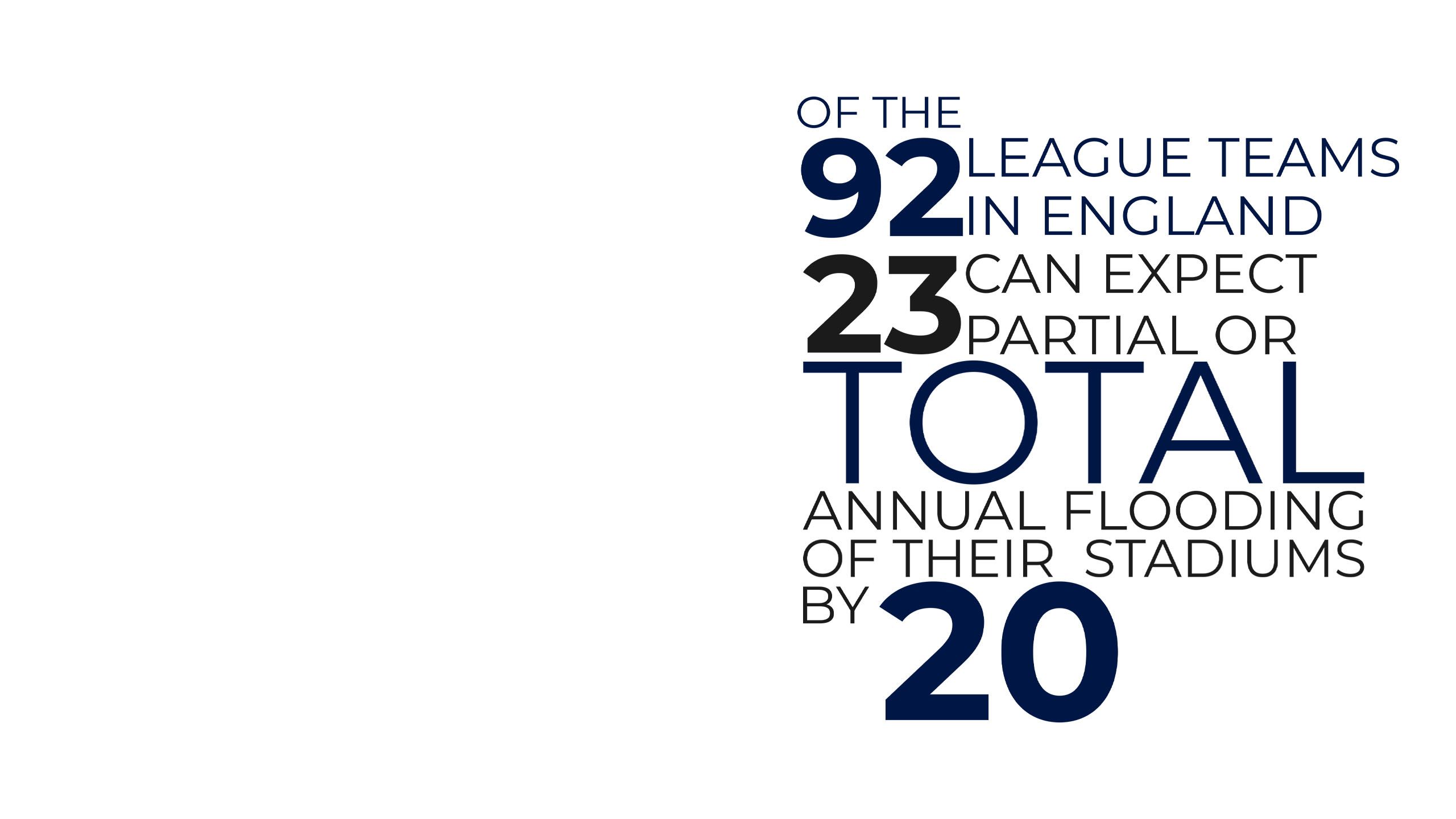
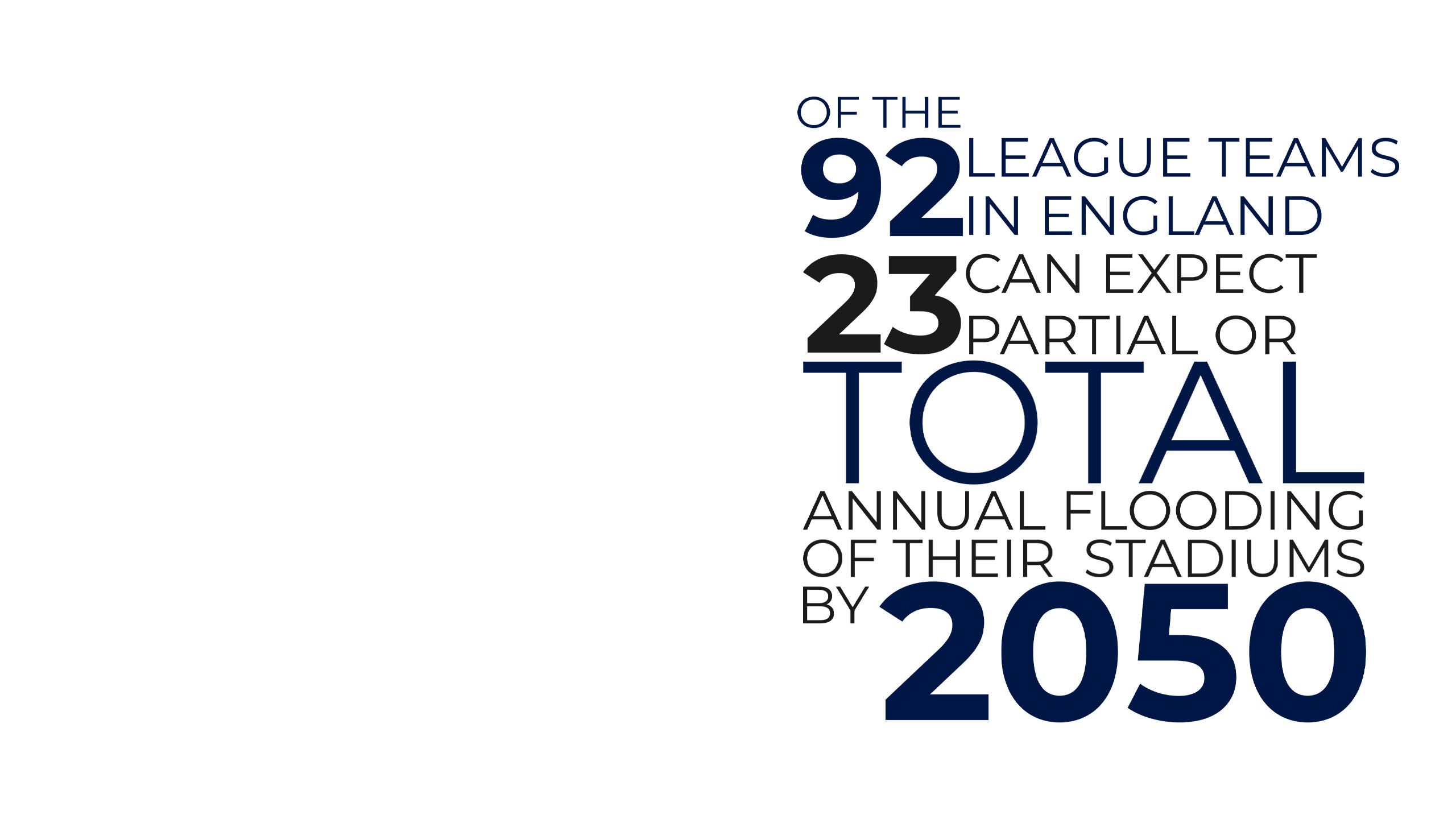
That informed understanding is where the rubber hits the road on green issues. Without really grasping why this is the most important challenge of our lifetimes, we risk any attempt towards the greening of football being little more than box-ticking tokenism or PR lip service.
Climate change and environmentalism more widely isn’t just a big issue, it is the biggest issue. And it’s too big for many to really comprehend.
Even when there is a terrible storm which floods homes and drowns people, it is easily dismissed, especially by those who it does not affect as ‘just one of those things.’ Bad weather has always happened, after all. So we ignore it, put our heads down or look for get-out clauses to excuse ourselves.
But climate change isn’t down to dumb luck. It is every bit as much cause and effect as covid-19 is. You put so much carbon into the atmosphere and climate change comes out.
A report produced by David Goldblatt for the Rapid Transition Alliance last year found that of the 92 league teams in England, 23 can expect partial or total annual flooding of their stadiums by 2050.
Under threat in the Premier League are Southampton’s St Mary’s, Norwich’s Carrow Road, Chelsea’s Stamford Bridge and West Ham’s Olympic Stadium, while seven are at risk in the Championship. This is not something we can just go on ignoring.
This is where football could make such a difference in informing, educating, inspiring and, setting an example for its public, yet in the Premier League Sustainability Table, exactly half the clubs scored zero for ‘Comms & Engagement on Sustainability', doing little or nothing at all in this regard.
Football is dirty
Many of us probably assume that science and technology will bail us all out of the worst consequences of climate change. We’ll build bigger flood defences and more solar panels - or just wear waders all the time. It’s an attitude which dilutes the urgency that climate science says is upon us, even as the permafrost of Siberia melts. Such an assumption about the future allows us to stop thinking about what should happen today.
We are understandably cynical of our individual power to make any meaningful contribution to change. This cynicism is only further provoked when we see companies using ecological issues as just another marketing tool. And when we hear that the cardboard, paper and plastic we put into the bins at recycling centres is in fact often not recycled at all but burnt or dumped or shipped out to unregulated developing world countries to dispose of, and while China is building coal-burning power stations, our tiny contribution feels like nothing and almost pointless.
So in this context, it is more than understandable that we rarely if ever think about how green our football club is, nor how green football as an industry might be.
But we absolutely must start to and start now.
Because here is the thing: football at the highest levels is really dirty. It is terrible for the climate and for the planet and it simply cannot be allowed to go on polluting the atmosphere the way that has become entirely the norm. We must make a stand and say up with this we will not put any longer.
To put into perspective just how big football’s impact is, the total carbon footprint of the Euro 2016 finals was 2.8million tonnes, equivalent to the annual carbon footprint of 282,500 Europeans according to their calculations. And that tournament was held entirely in France.
The decision to play Euro 2020 in many different countries necessitating ferrying people by plane all over the continent attracted widespread environmental criticism, and rightly so. It was and is a ludicrous and totally unnecessary idea.
UEFA is offsetting aviation emissions from Euro 2020 out of its own budget by investing in reforestation projects. While this sounds good, the reality is different.
First, planting trees is all well and good, but it’ll take 20 years for it to grow and start delivering on its offsetting goals. We might not have 20 years.
Furthermore, Anja Kollmuss, a policy analyst in Zurich who studies emissions trading has said most offsets being sold by brokers, businesses and governments don’t deliver the emissions reductions they promise: “There are many more bad offsets than there are good offsets.”
In any case, offsetting does not encourage the reduction of emissions; indeed, they remove the need to do so. This isn’t supposed to be an exercise in getting out of doing the right thing, it’s about actually doing the right thing.
While offsetting may have some role to play in the transition from the fossil fuel economy to a green economy, it would be far simpler and far more effective to require clubs not to fly at all and not to play European football on such a scale.





The decision to play Euro 2020 in many different countries necessitating ferrying people by plane all over the continent attracted widespread environmental criticism, and rightly so. It was and is a ludicrous and totally unnecessary idea.
UEFA is offsetting aviation emissions from Euro 2020 out of its own budget by investing in reforestation projects. While this sounds good, the reality is different.
First, planting trees is all well and good, but it’ll take 20 years for it to grow and start delivering on its offsetting goals. We might not have 20 years.
Furthermore, Anja Kollmuss, a policy analyst in Zurich who studies emissions trading has said most offsets being sold by brokers, businesses and governments don’t deliver the emissions reductions they promise: “There are many more bad offsets than there are good offsets.”
In any case, offsetting does not encourage the reduction of emissions; indeed, they remove the need to do so. But this isn’t supposed to be an exercise in getting out of doing the right thing, it’s about actually doing the right thing.
While offsetting may have some role to play in the transition from the fossil fuel economy to a green economy, it would be far simpler and far more effective to require clubs not to fly at all and not to play European football on such a scale.
Flying is the biggest, most dirty, most environmentally destructive thing about football. That and the pizza sold at Hibernian’s Easter Road ground, which looks like it is made from plastic bags and gloss paint.
Yet, every season, internationals, Champions League and Europa League games require teams to make huge round trips often of many thousands of miles by air, and these trips are done without any questioning of the environmental cost.
Do we really want to put the viability of the planet as our home at risk just so we can see Chelsea play Krasnodar in Russia? These are two games that involved a 4,200 mile round trip for the away team. Myclimate.org calculates that those air miles will put over three tonnes of carbon into the atmosphere, not per trip but per player.
For perspective, the average per person in the EU is 8.7 tonnes per year per person according to the European Environment Agency, but to slow down and halt climate change, that needs to be 0.6 tonnes or less. Not in 10 or 20 years’ time, but now. Today.
But every Chelsea player was responsible for that amount just by flying to play Rennes in the Champions League group stage. A report in November 2019 found air travel by the top 20 footballers nominated for the Ballon d'Or that year was responsible for producing 505 tonnes of carbon dioxide (CO2) emissions.
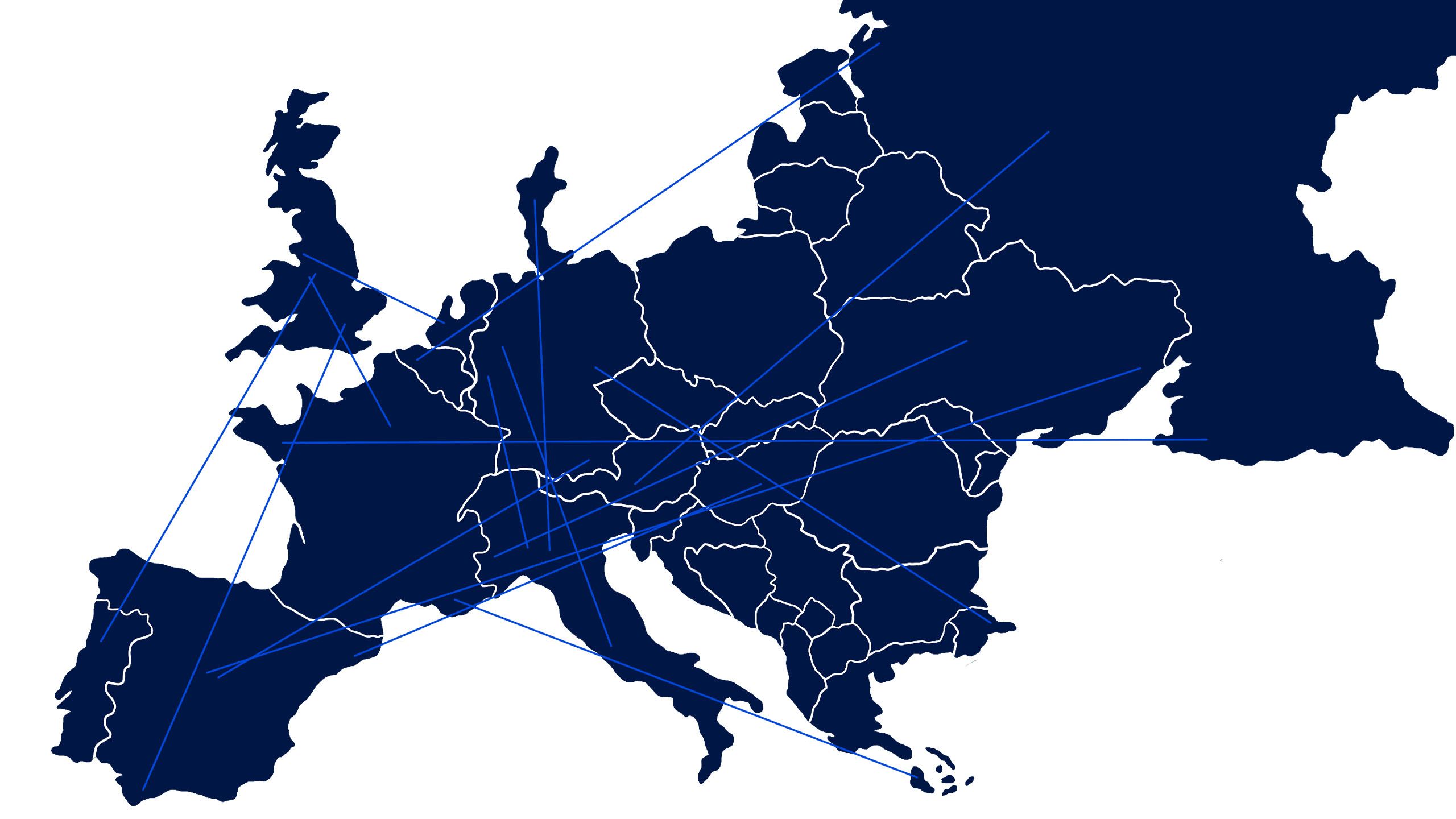
Flying is the biggest, most dirty, most environmentally destructive thing about football. That and the pizza sold at Hibernian’s Easter Road ground, which looks like it is made from plastic bags and gloss paint.
Yet, every season, internationals, Champions League and Europa League games require teams to make huge round trips often of many thousands of miles by air, and these trips are done without any questioning of the environmental cost.
Do we really want to put the viability of the planet as our home at risk, just so we can see Chelsea play Krasnodar in Russia? These are two games that involved a 4,200 mile round trip for the away team. Myclimate.org calculates that those air miles will put over three tonnes of carbon into the atmosphere, not per trip but per player.
For perspective, the average per person in the EU is 8.7 tonnes per year per person according to the European Environment Agency, but to slow down and halt climate change, that needs to be 0.6 tonnes or less. Not in 10 or 20 years’ time, but now. Today.
But every Chelsea player was responsible for that amount just by flying to play Rennes in the Champions League group stage. A report in November 2019 found air travel by the top 20 footballers nominated for the Ballon d'Or that year was responsible for producing 505 tonnes of carbon dioxide (CO2) emissions.

There is no point in clubs having an environmental policy trumpeting their progress on renewables and recycling on the one hand while on the other going against all of that by flying tens of thousands of miles per season.
But who will be the first to connect the dots and say to UEFA, sorry, we’re not taking part in a tournament which is so corrupting to the climate? Without such a move, all the other measures look more like PR than progress.
There is no point in being half-hearted about this. There is only one solution to this massive pollution problem. Flying football teams to games must stop and stop now. Clubs either travel to distant parts, be they Renne or Russia, across land by the greenest, lowest polluting forms of transport, or we do without European football and internationals on anything other than an occasional basis. If flying is the only practical way to get to a game, then that game cannot be played.
If that means the two European tournaments have to be entirely restructured or simply abandoned altogether, so be it. Playing European football games is not some sort of human right, after all.
The game will not be any the less popular without them. We want a healthy planet more than we want football played between two sides that involves thousands of miles of air travel. I mean, we do, don’t we? Surely we do.
Because this is serious now. Really serious. That we are demanding so much carbon be pumped into the atmosphere merely so we can watch what will likely be an insignificant, quite possibly boring game of football, is, if you stand back and look at it objectively, abso-f*cking-lutely-insane.
We can do without seeing Chelsea play Krasnodar and all the other fixtures that involve so much travel. In fact, we must do without it. What could possibly be the argument for it to continue? Just thinking we can still strut around the world spewing out carbon just to play football is pathetic, weak, narrow-minded and arrogant.









There is no point in clubs having an environmental policy trumpeting their progress on renewables and recycling on the one hand while on the other going against all of that by flying tens of thousands of miles per season.
But who will be the first to connect the dots and say to UEFA, sorry, we’re not taking part in a tournament which is so corrupting to the climate? Without such a move, all the other measures look more like PR than progress.
There is no point in being half-hearted about this. There is only one solution to this massive pollution problem. Flying football teams to games must stop and stop now. Clubs either travel to distant parts, be they Renne or Russia, across land by the greenest, lowest polluting forms of transport, or we do without European football and internationals on anything other than an occasional basis. If flying is the only practical way to get to a game, then that game cannot be played.
If that means the two European tournaments have to be entirely restructured or simply abandoned altogether, so be it. Playing European football games is not some sort of human right, after all.
The game will not be any the less popular without them. We want a healthy planet more than we want football played between two sides that involves thousands of miles of air travel. I mean, we do, don’t we? Surely we do.
Because this is serious now. Really serious. That we are demanding so much carbon be pumped into the atmosphere merely so we can watch what will likely be an insignificant, quite possibly boring game of football, is, if you stand back and look at it objectively, abso-f*cking-lutely-insane.
We can do without seeing Chelsea play Krasnodar and all the other fixtures that involve so much travel. In fact, we must do without it. What could possibly be the argument for it to continue? Just thinking we can still strut around the world spewing out carbon just to play football is pathetic, weak, narrow-minded and arrogant.
Work to do at home
Even if we end flying to games - and we must - that is not the matter sorted for football. There has to be a total and absolute green revolution for the game, every bit as much as there needs to be in the rest of society. We need joined-up thinking and a profoundly holistic approach that understands the interconnectivity of everything.
Hand-in-hand with ending air travel by clubs, we need to fully develop a comprehensive green transport system over land for both teams and fans, thus ending the idea that you can just jump into your diesel-powered car and drive to a game. After all, if SUV owners were a country they’d be the seventh biggest polluters on the planet
Football needs an independent environmental task force to regulate and strictly enforce the highest green standards at every professional club, with draconian measures that include expulsion from the league for those who don’t comply. A central green fund built from a percentage of every club’s turnover could be set up so all clubs can afford the measures needed, funded from within the game.
A green future should not be feared. Not even if it means our football clubs cannot fly to distant parts to play. Indeed, it isn’t hard to imagine future generations wondering why on earth we indulged in such reckless behaviour, even when we knew what the effect was.
Everything in football needs to be eco-checked, from the source of power at the club, how it uses water and what it sells, right down to the materials used for shirts (Forest Green Rovers’ shirts are now 50% bamboo, moving towards being 100% free of plastic microfibers), the cars driven by players and staff, and the business it does with sponsors. Everything.
A report from the New Weather Institute, Possible and the Rapid Transition Alliance for the Badvertising campaign found 258 sponsorship deals across multiple countries and sports with companies promoting high-carbon products, services and lifestyles.
There have been measures put in place to reduce carbon emissions and play a bigger role in tackling the climate crisis, but do these clubs really care? Can they and football's governing bodies really be trusted to self-police?
We even need to question if having a nationwide league is environmentally viable when it means Newcastle United and their thousands of fans are often making a 550-mile round trip to the capital to see and play games against six London clubs, another 650 to play Southampton and nearly 700 to get to and from Brighton?
Even worse, Arsenal infamously took a 14-minute flight to Norwich in 2015, while more recently Liverpool flew 17 minutes to Doncaster ahead of a game at Sheffield United. Clubs are putting marginal gains ahead of the good of the planet and getting away with it.
And it’s not just the teams who are travelling to games, of course. David Goldblatt's report for the Rapid Transition Alliance found spectators emitted at least 72,500 tonnes from transport to games over the course of a year.

Work to do at home
Even if we end flying to games - and we must - that is not the matter sorted for football. There has to be a total and absolute green revolution for the game, every bit as much as there needs to be in the rest of society. We need joined-up thinking and a profoundly holistic approach that understands the interconnectivity of everything.
Hand-in-hand with ending air travel by clubs, we need to fully develop a comprehensive green transport system over land for both teams and fans, thus ending the idea that you can just jump into your diesel-powered car and drive to a game. After all, if SUV owners were a country they’d be the seventh biggest polluters on the planet
Football needs an independent environmental task force to regulate and strictly enforce the highest green standards at every professional club, with draconian measures that include expulsion from the league for those who don’t comply. A central green fund built from a percentage of every club’s turnover could be set up so all clubs can afford the measures needed, funded from within the game.
A green future should not be feared. Not even if it means our football clubs cannot fly to distant parts to play. Indeed, it isn’t hard to imagine future generations wondering why on earth we indulged in such reckless behaviour, even when we knew what the effect was.
Everything in football needs to be eco-checked, from the source of power at the club, how it uses water and what it sells, right down to the materials used for shirts (Forest Green Rovers’ shirts are now 50% bamboo, moving towards being 100% free of plastic microfibers), the cars driven by players and staff, and the business it does with sponsors. Everything.
A report from the New Weather Institute, Possible and the Rapid Transition Alliance for the Badvertising campaign found 258 sponsorship deals across multiple countries and sports with companies promoting high-carbon products, services and lifestyles.
There have been measures put in place to reduce carbon emissions and play a bigger role in tackling the climate crisis, but do these clubs really care? Can they and football's governing bodies really be trusted to self-police?
We even need to question if having a nationwide league is environmentally viable when it means Newcastle United and their thousands of fans are often making a 550-mile round trip to the capital to see and play games against six London clubs, another 650 to play Southampton and nearly 700 to get to and from Brighton?
Even worse, Arsenal infamously took a 14-minute flight to Norwich in 2015, while more recently Liverpool flew 17 minutes to Doncaster ahead of a game at Sheffield United. Clubs are putting marginal gains ahead of the good of the planet and getting away with it.
And it’s not just the teams who are travelling to games, of course. David Goldblatt's report for the Rapid Transition Alliance found spectators emitted at least 72,500 tonnes from transport to games over the course of a year.
The argument for not just the revival of the Third Division North and South idea but for all football to be played within defined local regions is now compelling. It would cut down on car travelling for fans and clubs alike, perhaps with play-offs between winners of each region to establish an overall winner in a game played equidistant between the two clubs.
I know this is all hard to comprehend in some ways as it involves a major alteration to how things have been, and I know it is hard to fully grasp the extent to which every aspect of our lives, including our football lives, will have to change in aim, ambition and detail if we are to merely slow down and limit climate change. It involves questioning everything.
But it has to be done, and it has to be done by football as much as by any other industry or walk of life. Indeed, football could set a fantastic example as a progressive industry that is doing everything it can do, no matter what it takes.
The drive and energy for this movement will likely have to come from the ground up, not from top down. Football’s governing bodies have so far shown themselves to be largely deaf, dumb and blind to these most pressing issues and they’re so mired in bureaucracy and self-interest that we’ll all have polar bears sunbathing in our garden before they do anything.
The problem is, clubs are also mired in bureaucracy and self-interest, forever paranoid that others will get one up on them, somehow, afraid to change in case no-one else changes. But the climate crisis does not discriminate between United, City, Town or Athletic. It affects all equally and it will not wait.
We cannot allow ourselves to think any of this is unrealistic and unachievable. We genuinely can unzip our old mindset and cast it off. Football can become far less international and much more local.
This wouldn’t be bad. The important thing about watching football is being there to watch. Who the game is against is less fundamental. If my club, Middlesbrough are playing Copenhagen or Krasnodar, I’m no more interested than if they’re playing Crook Town or Coventry. The distance a team has travelled makes no difference to fans, but it makes a lot of difference to the Earth.
Greening football is just common sense and in no way extreme. Here’s what is really extreme: polluting your home and in doing so actually killing people and making some parts of our home uninhabitable.
This is the only planet we’ve got, so let’s be its friend. Because, let’s face it, you wouldn’t kill your friend just to watch Chelsea play Krasnodar, would you?
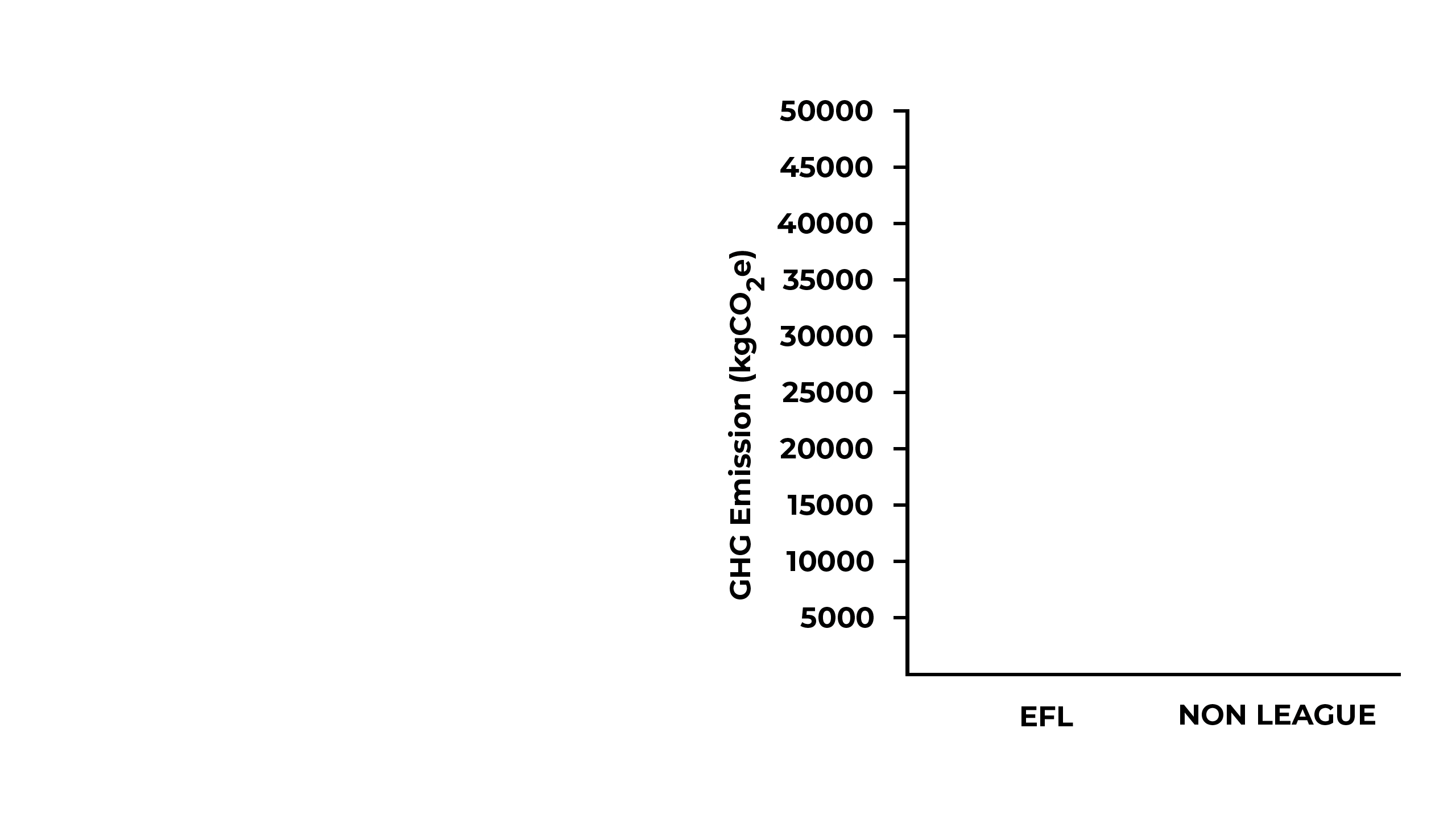
The argument for not just the revival of the Third Division North and South idea but for all football to be played within defined local regions is now compelling. It would cut down on car travelling for fans and clubs alike, perhaps with play-offs between winners of each region to establish an overall winner in a game played equidistant between the two clubs.
I know this is all hard to comprehend in some ways as it involves a major alteration to how things have been, and I know it is hard to fully grasp the extent to which every aspect of our lives, including our football lives, will have to change in aim, ambition and detail if we are to merely slow down and limit climate change. It involves questioning everything.
But it has to be done, and it has to be done by football as much as by any other industry or walk of life. Indeed, football could set a fantastic example as a progressive industry that is doing everything it can do, no matter what it takes.
The drive and energy for this movement will likely have to come from the ground up, not from top down. Football’s governing bodies have so far shown themselves to be largely deaf, dumb and blind to these most pressing issues and they’re so mired in bureaucracy and self-interest that we’ll all have polar bears sunbathing in our garden before they do anything.
The problem is, clubs are also mired in bureaucracy and self-interest, forever paranoid that others will get one up on them, somehow, afraid to change in case no-one else changes.
But the climate crisis does not discriminate between United, City, Town or Athletic. It affects all equally and it will not wait.
We cannot allow ourselves to think any of this is unrealistic and unachievable. We genuinely can unzip our old mindset and cast it off. Football can become far less international and much more local. This wouldn’t be bad.
The important thing about watching football is being there to watch. Who the game is against is less fundamental. If my club, Middlesbrough are playing Copenhagen or Krasnodar, I’m no more interested than if they’re playing Crook Town or Coventry. The distance a team has travelled makes no difference to fans, but it makes a lot of difference to the Earth.
Greening football is just common sense and in no way extreme. Here’s what is really extreme: polluting your home and in doing so actually killing people and making some parts of our home uninhabitable.
This is the only planet we’ve got, so let’s be its friend. Because, let’s face it, you wouldn’t kill your friend just to watch Chelsea play Krasnodar, would you?
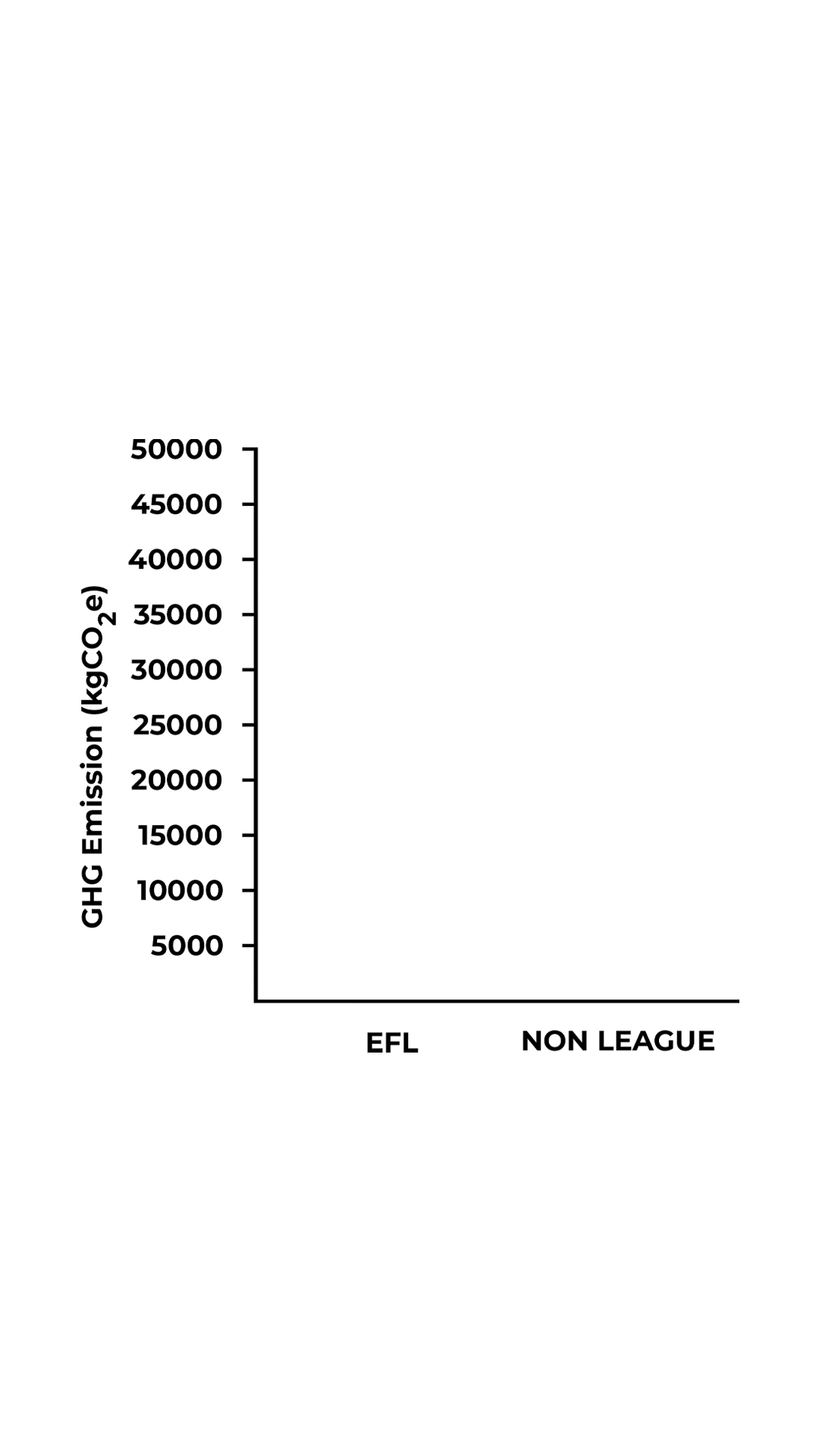
This is the only planet we've got,
so let's be its friend.
Because let's face it, you wouldn't kill your friend just to watch Chelsea play Krasnodar, would you?


This is the only planet we've got,
so let's be its friend.
Because let's face it, you wouldn't kill your friend just to watch Chelsea play Krasnodar, would you?


